In the UK’s demanding healthcare system, Health Care Assistants (HCAs) serve as vital contributors to the delivery of patient care. Whether supporting hospital wards, care homes, or community services, HCAs ensure that individuals receive compassionate assistance, clinical monitoring, and daily support.
Particularly in London, where population density and medical needs are high, the role of a healthcare assistant is both essential and diverse. This article explores the ten key job duties of HCAs and highlights the skills and responsibilities they must carry out in modern British healthcare environments.
What Are the Primary Responsibilities of a Healthcare Assistant?
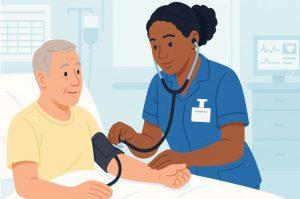
A healthcare assistant provides a mix of personal and clinical support to patients, often under the supervision of nurses or doctors. Their work can vary depending on the setting, but the central focus remains on promoting patient comfort, safety, and dignity.
In clinical settings, HCAs are responsible for observing patient conditions and helping maintain vital records. They may assist in monitoring pulse, temperature, or respiratory rates and communicate these to medical teams. Additionally, they ensure that patients are clean, safe, and emotionally supported, becoming the point of contact for many basic care needs.
How Do Hcas Support Personal Care Tasks for Patients?
One of the most fundamental aspects of the HCA role involves helping patients with personal hygiene and everyday routines. This includes assistance with washing, dressing, grooming, and using the toilet especially for patients with mobility challenges or long-term illnesses.
These tasks require a combination of discretion, patience, and strong interpersonal skills. A healthcare assistant must balance clinical knowledge with empathy, ensuring that patients feel respected and comfortable during what can often be vulnerable moments. In elderly care, this function is particularly significant, as it directly impacts dignity and quality of life.
In What Ways Do Healthcare Assistants Assist Nurses and Doctors?
HCAs play a supportive role to nurses and doctors by handling practical tasks that allow medical professionals to focus on diagnostics and treatment. Their work improves care efficiency, particularly in busy hospital settings.
Here’s a breakdown of this collaboration:
| Type of Support | Examples of HCA Duties |
| Clinical Support | Preparing equipment, setting up for examinations |
| Administrative Tasks | Updating care plans, recording patient progress |
| Observational Monitoring | Reporting changes in condition to nurses or GPs |
| Patient Preparation | Assisting patients before surgery or tests |
By being hands-on in these areas, HCAs reduce delays in patient care delivery and strengthen the healthcare team’s workflow.
What Are the Typical Duties of a Care Assistant in a Hospital Setting?
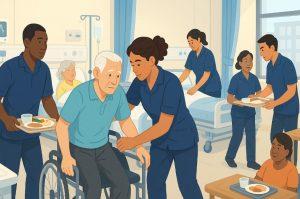
Within hospitals, HCAs are integral to patient management. They often work on wards where patients are recovering from operations, managing chronic illnesses, or undergoing rehabilitation.
A hospital-based HCA may help reposition patients to prevent bedsores, offer feeding assistance, and accompany patients to appointments. They may also help prepare rooms, clean equipment, and assist in admission or discharge procedures. In every interaction, they are expected to observe patient wellbeing and report any emotional or physical changes promptly.
The demands of this environment require quick thinking and the ability to work under pressure while maintaining compassionate care.
How Do Hcas Help With Hygiene and Infection Control?
Hygiene and infection control are critical in every healthcare environment, and HCAs are frontline enforcers of these standards. With strict NHS protocols in place, assistants must ensure that all surfaces, equipment, and personal care tasks adhere to cleanliness guidelines.
Key practices include:
| Hygiene Area | HCA Responsibilities |
| Personal Hygiene | Handwashing, PPE usage, sanitising patient areas |
| Environmental Hygiene | Cleaning beds, disinfecting shared equipment |
| Infection Control | Isolating infected patients when required |
By managing cleanliness meticulously, HCAs help to reduce the spread of infections like MRSA and COVID-19, protecting both patients and healthcare staff.
What Role Do Health Care Assistants Play in Patient Mobility and Movement?
Promoting mobility is a crucial part of recovery for many patients. HCAs often assist with walking, transferring from beds to chairs, and supporting physical therapy activities. They are trained to use hoists, wheelchairs, and other mobility aids correctly.
For patients who are bed-bound or recovering from surgery, movement helps prevent blood clots, muscle wasting, and pressure sores. In residential care homes, mobility assistance also contributes to improved mental health, reducing feelings of isolation and dependence.
By working closely with physiotherapists or occupational therapists, HCAs become an essential link in restoring a patient’s independence.
How Do Healthcare Support Workers Manage Communication With Patients and Staff?
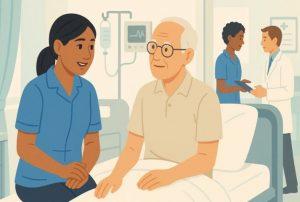
HCAs serve as crucial communicators within the healthcare system. They maintain a continuous presence with patients, making them ideally placed to notice subtle changes in condition or mood.
Effective communication involves more than conversation it includes:
- Accurately documenting patient updates in care records
- Relaying concerns or symptoms to nursing staff
- Providing reassurance and clear instructions to patients
In London’s multicultural healthcare settings, many HCAs are also multilingual or trained in communication techniques that bridge cultural gaps. This ability enhances the quality of care and reduces misunderstandings between patients and professionals.
Do HCAs Provide Medication Support or Assistance in the Uk?
Although HCAs do not typically administer medication, they often assist patients in managing their medicine routines under strict supervision. Their role is to support not replace the nurse or pharmacist.
In care home settings or under NHS Trust policies, trained HCAs may help by reminding patients to take their medication, opening containers, or ensuring medication is taken at the correct time. Any reactions or issues are immediately reported to the supervising nurse.
This supportive role enhances medication adherence, especially in elderly or memory-impaired patients, without crossing regulatory boundaries.
What Are the Daily Shift Duties of a Healthcare Assistant in Care Homes?
Care homes provide 24-hour support, so HCA duties vary by shift. However, each day involves a mix of personal care, routine checks, and social engagement with residents.
A simplified view of their day includes:
| Shift Period | Primary Responsibilities |
| Morning | Wake-up routines, hygiene assistance, breakfast supervision |
| Midday | Medication support, lunch service, companionship activities |
| Evening | Toileting assistance, dinner, preparing for bed |
| Night | Overnight monitoring, comfort care, emergency response |
Because care home residents often face chronic or age-related conditions, HCAs must work attentively, offering both physical and emotional care.
How Does Working in Residential Care Homes Differ for HCAs?
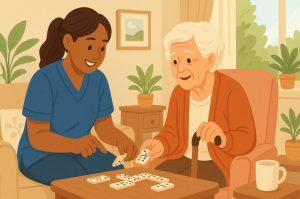
Residential care homes focus less on acute clinical care and more on long-term support. HCAs here are expected to develop stronger emotional bonds with residents, understanding their habits, preferences, and family dynamics.
Unlike in hospitals, where the pace is rapid and condition-based, care home duties require patience and routine. Tasks revolve around sustaining independence, providing companionship, and ensuring residents feel at home.
This role suits those who prefer relationship-driven care and want to make a long-term difference in residents’ lives.
Conclusion
Health care assistants in the UK are much more than support workers they are the glue that holds the patient care process together. From hygiene management to emotional support, from mobility aid to infection control, their responsibilities touch every aspect of a patient’s experience. Particularly in a complex healthcare hub like London, HCAs are vital in ensuring care delivery is safe, compassionate, and effective.
Understanding their wide-ranging duties not only highlights the value they bring but also opens the door for more structured training, better career progression, and recognition of their essential contributions to healthcare.
FAQs
What qualifications are required to become a healthcare assistant in the UK?
Most HCAs start with GCSEs in English and Maths. Employers often provide training, but a Level 2 or 3 Diploma in Health and Social Care is advantageous.
Can a healthcare assistant work both in hospitals and care homes?
Yes. Many HCAs switch between NHS hospitals and private care homes, gaining diverse experience across patient care settings.
Is prior medical training necessary for healthcare assistant jobs?
Not always. Many roles provide on-the-job training. However, previous experience in care or an NVQ qualification improves job prospects.
What is the salary range for healthcare assistants in London?
Typically, HCAs earn between £20,000 and £26,000 annually in London, depending on NHS Band and experience.
Do healthcare assistants work night shifts and weekends?
Yes. Shift work, including nights, weekends, and public holidays, is common especially in hospital and residential care facilities.
How do healthcare assistants handle emergency situations?
They are trained to alert medical staff quickly, follow emergency protocols, and provide first-level support like CPR if trained.
Are there career progression opportunities for healthcare assistants in the NHS?
Definitely. HCAs can progress into nursing, mental health support, or even paramedic roles through additional qualifications and NHS training routes.








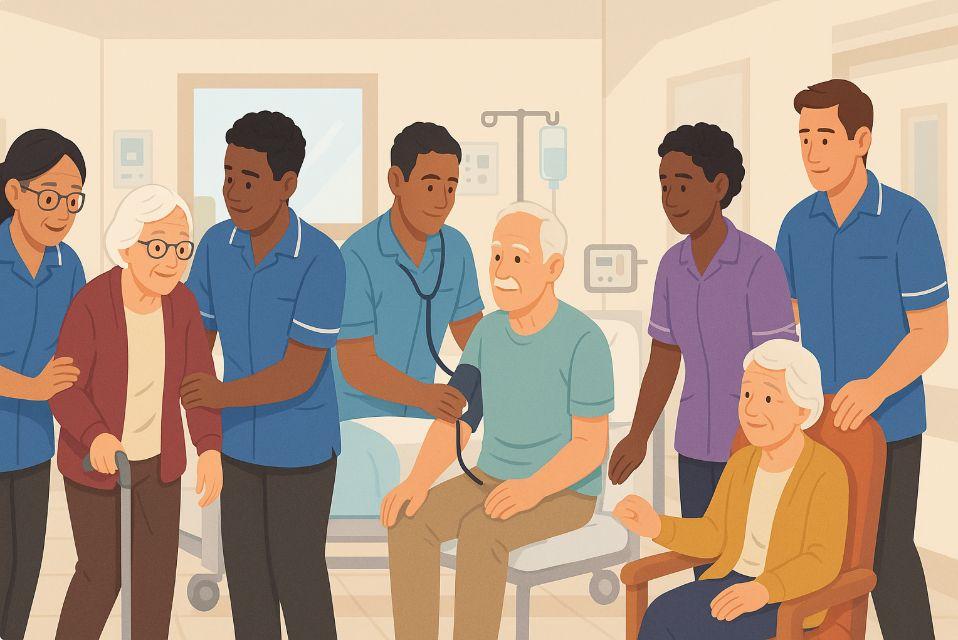
Leave feedback about this